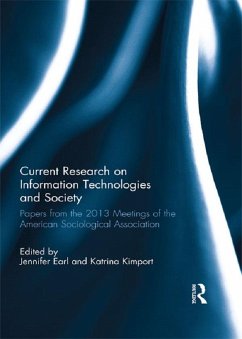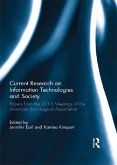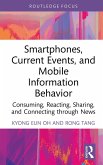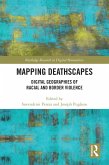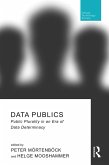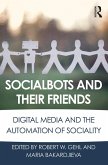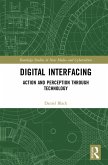Current Research on Information Technologies and Society (eBook, ePUB)
Papers from the 2013 Meetings of the American Sociological Association
Redaktion: Earl, Jennifer; Kimport, Katrina
39,95 €
39,95 €
inkl. MwSt.
Sofort per Download lieferbar

20 °P sammeln
39,95 €
Als Download kaufen

39,95 €
inkl. MwSt.
Sofort per Download lieferbar

20 °P sammeln
Jetzt verschenken
Alle Infos zum eBook verschenken
39,95 €
inkl. MwSt.
Sofort per Download lieferbar
Alle Infos zum eBook verschenken

20 °P sammeln
Current Research on Information Technologies and Society (eBook, ePUB)
Papers from the 2013 Meetings of the American Sociological Association
Redaktion: Earl, Jennifer; Kimport, Katrina
- Format: ePub
- Merkliste
- Auf die Merkliste
- Bewerten Bewerten
- Teilen
- Produkt teilen
- Produkterinnerung
- Produkterinnerung

Bitte loggen Sie sich zunächst in Ihr Kundenkonto ein oder registrieren Sie sich bei
bücher.de, um das eBook-Abo tolino select nutzen zu können.
Hier können Sie sich einloggen
Hier können Sie sich einloggen
Sie sind bereits eingeloggt. Klicken Sie auf 2. tolino select Abo, um fortzufahren.

Bitte loggen Sie sich zunächst in Ihr Kundenkonto ein oder registrieren Sie sich bei bücher.de, um das eBook-Abo tolino select nutzen zu können.
This book presents the latest in research on communication and information technologies, including chapters demonstrating the maturation of work on measurement, investigating user behaviour, and delving into the new terrain of theorizing social media use.
This book was originally published as a special issue of Information, Communication & Society .
- Geräte: eReader
- ohne Kopierschutz
- eBook Hilfe
- Größe: 0.54MB
Andere Kunden interessierten sich auch für
![Current Research on Information Technologies and Society (eBook, PDF) Current Research on Information Technologies and Society (eBook, PDF)]() Current Research on Information Technologies and Society (eBook, PDF)39,95 €
Current Research on Information Technologies and Society (eBook, PDF)39,95 €![Smartphones, Current Events and Mobile Information Behavior (eBook, ePUB) Smartphones, Current Events and Mobile Information Behavior (eBook, ePUB)]() Kyong Eun OhSmartphones, Current Events and Mobile Information Behavior (eBook, ePUB)20,95 €
Kyong Eun OhSmartphones, Current Events and Mobile Information Behavior (eBook, ePUB)20,95 €![Mapping Deathscapes (eBook, ePUB) Mapping Deathscapes (eBook, ePUB)]() Mapping Deathscapes (eBook, ePUB)40,95 €
Mapping Deathscapes (eBook, ePUB)40,95 €![Journalism History and Digital Archives (eBook, ePUB) Journalism History and Digital Archives (eBook, ePUB)]() Journalism History and Digital Archives (eBook, ePUB)41,95 €
Journalism History and Digital Archives (eBook, ePUB)41,95 €![Data Publics (eBook, ePUB) Data Publics (eBook, ePUB)]() Data Publics (eBook, ePUB)40,95 €
Data Publics (eBook, ePUB)40,95 €![Socialbots and Their Friends (eBook, ePUB) Socialbots and Their Friends (eBook, ePUB)]() Socialbots and Their Friends (eBook, ePUB)44,95 €
Socialbots and Their Friends (eBook, ePUB)44,95 €![Digital Interfacing (eBook, ePUB) Digital Interfacing (eBook, ePUB)]() Daniel BlackDigital Interfacing (eBook, ePUB)41,95 €
Daniel BlackDigital Interfacing (eBook, ePUB)41,95 €-
-
-
This book presents the latest in research on communication and information technologies, including chapters demonstrating the maturation of work on measurement, investigating user behaviour, and delving into the new terrain of theorizing social media use.
This book was originally published as a special issue of Information, Communication & Society.
This book was originally published as a special issue of Information, Communication & Society.
Dieser Download kann aus rechtlichen Gründen nur mit Rechnungsadresse in A, B, BG, CY, CZ, D, DK, EW, E, FIN, F, GR, HR, H, IRL, I, LT, L, LR, M, NL, PL, P, R, S, SLO, SK ausgeliefert werden.
Produktdetails
- Produktdetails
- Verlag: Taylor & Francis eBooks
- Seitenzahl: 144
- Erscheinungstermin: 17. März 2016
- Englisch
- ISBN-13: 9781317615255
- Artikelnr.: 57070725
- Verlag: Taylor & Francis eBooks
- Seitenzahl: 144
- Erscheinungstermin: 17. März 2016
- Englisch
- ISBN-13: 9781317615255
- Artikelnr.: 57070725
- Herstellerkennzeichnung Die Herstellerinformationen sind derzeit nicht verfügbar.
Jennifer Earl is a Professor of Sociology at the University of Arizona, USA. She is also Director Emerita of the Center for Information Technology and Society at University of California, Santa Barbara. Her research focuses on social movements, information technologies, and the sociology of law. Katrina Kimport is an Assistant Professor in the Department of Obstetrics, Gynecology & Reproductive Science and a research sociologist in the Advancing New Standards in Reproductive Health (ANSIRH) program at the University of California, San Francisco, USA. Her research focuses on gender, sexuality, and social movements.
1. Hitting middle age never felt so good: introduction to the American
Sociological Association Communication and Information Technologies section
2013 Jennifer Earl and Katrina Kimport 2. Testing the validity of social
capital measures in the study of information and communication technologies
Lora Appel, Punit Dadlani, Maria Dwyer, Keith Hampton, Vanessa Kitzie, Ziad
A. Matni, Patricia Moore and Rannie Teodoro 3. Dimensions of Internet use:
amount, variety, and types Grant Blank and Darja Groselj 4. Twitter
publics: how online political communities signaled electoral outcomes in
the 2010 US house election Karissa McKelvey, Joseph DiGrazia and Fabio
Rojas 5. No praise without effort: experimental evidence on how rewards
affect Wikipedia's contributor community Michael Restivo and Arnout van de
Rijt 6. Need to know vs. need to share: information technology and the
intersecting work of police, fire and paramedics Carrie B. Sanders 7.
Context collapse: theorizing context collusions and collisions Jenny L.
Davis and Nathan Jurgenson 8. Are we all equally at home socializing
online? Cyberasociality and evidence for an unequal distribution of disdain
for digitally-mediated sociality Zeynep Tufekci and Matthew E. Brashears
9. Revisiting the digital divide in Canada: the impact of demographic
factors on access to the internet, level of online activity, and social
networking site usage Michael Haight, Anabel Quan-Haase and Bradley A.
Corbett
Sociological Association Communication and Information Technologies section
2013 Jennifer Earl and Katrina Kimport 2. Testing the validity of social
capital measures in the study of information and communication technologies
Lora Appel, Punit Dadlani, Maria Dwyer, Keith Hampton, Vanessa Kitzie, Ziad
A. Matni, Patricia Moore and Rannie Teodoro 3. Dimensions of Internet use:
amount, variety, and types Grant Blank and Darja Groselj 4. Twitter
publics: how online political communities signaled electoral outcomes in
the 2010 US house election Karissa McKelvey, Joseph DiGrazia and Fabio
Rojas 5. No praise without effort: experimental evidence on how rewards
affect Wikipedia's contributor community Michael Restivo and Arnout van de
Rijt 6. Need to know vs. need to share: information technology and the
intersecting work of police, fire and paramedics Carrie B. Sanders 7.
Context collapse: theorizing context collusions and collisions Jenny L.
Davis and Nathan Jurgenson 8. Are we all equally at home socializing
online? Cyberasociality and evidence for an unequal distribution of disdain
for digitally-mediated sociality Zeynep Tufekci and Matthew E. Brashears
9. Revisiting the digital divide in Canada: the impact of demographic
factors on access to the internet, level of online activity, and social
networking site usage Michael Haight, Anabel Quan-Haase and Bradley A.
Corbett
1. Hitting middle age never felt so good: introduction to the American
Sociological Association Communication and Information Technologies section
2013 Jennifer Earl and Katrina Kimport 2. Testing the validity of social
capital measures in the study of information and communication technologies
Lora Appel, Punit Dadlani, Maria Dwyer, Keith Hampton, Vanessa Kitzie, Ziad
A. Matni, Patricia Moore and Rannie Teodoro 3. Dimensions of Internet use:
amount, variety, and types Grant Blank and Darja Groselj 4. Twitter
publics: how online political communities signaled electoral outcomes in
the 2010 US house election Karissa McKelvey, Joseph DiGrazia and Fabio
Rojas 5. No praise without effort: experimental evidence on how rewards
affect Wikipedia's contributor community Michael Restivo and Arnout van de
Rijt 6. Need to know vs. need to share: information technology and the
intersecting work of police, fire and paramedics Carrie B. Sanders 7.
Context collapse: theorizing context collusions and collisions Jenny L.
Davis and Nathan Jurgenson 8. Are we all equally at home socializing
online? Cyberasociality and evidence for an unequal distribution of disdain
for digitally-mediated sociality Zeynep Tufekci and Matthew E. Brashears
9. Revisiting the digital divide in Canada: the impact of demographic
factors on access to the internet, level of online activity, and social
networking site usage Michael Haight, Anabel Quan-Haase and Bradley A.
Corbett
Sociological Association Communication and Information Technologies section
2013 Jennifer Earl and Katrina Kimport 2. Testing the validity of social
capital measures in the study of information and communication technologies
Lora Appel, Punit Dadlani, Maria Dwyer, Keith Hampton, Vanessa Kitzie, Ziad
A. Matni, Patricia Moore and Rannie Teodoro 3. Dimensions of Internet use:
amount, variety, and types Grant Blank and Darja Groselj 4. Twitter
publics: how online political communities signaled electoral outcomes in
the 2010 US house election Karissa McKelvey, Joseph DiGrazia and Fabio
Rojas 5. No praise without effort: experimental evidence on how rewards
affect Wikipedia's contributor community Michael Restivo and Arnout van de
Rijt 6. Need to know vs. need to share: information technology and the
intersecting work of police, fire and paramedics Carrie B. Sanders 7.
Context collapse: theorizing context collusions and collisions Jenny L.
Davis and Nathan Jurgenson 8. Are we all equally at home socializing
online? Cyberasociality and evidence for an unequal distribution of disdain
for digitally-mediated sociality Zeynep Tufekci and Matthew E. Brashears
9. Revisiting the digital divide in Canada: the impact of demographic
factors on access to the internet, level of online activity, and social
networking site usage Michael Haight, Anabel Quan-Haase and Bradley A.
Corbett
